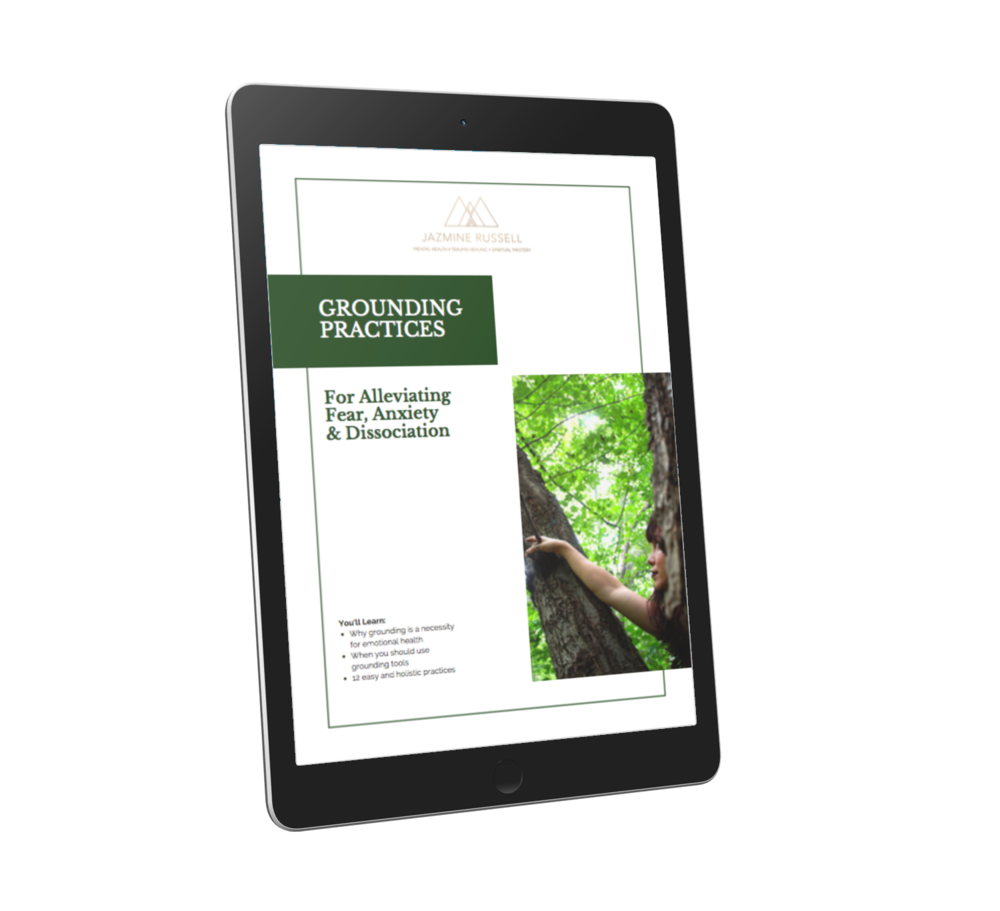Feeling Lost After An Intense Spiritual Crisis? Here Are 10 Integration Strategies.
Feeling Lost After An Intense Spiritual Crisis?
Here Are 10 Integration Strategies
In 2015, I thought I had completely gone “crazy.” I broke with consensus reality to find myself seeing and hearing things that other people didn’t. I saw shadowy figures telling me horrifying things, I went from euphoria to sheer terror in a matter of minutes. I felt expansive, raw, too sensitive, went into intense trance-like states, believed things that ‘didn’t make sense’ and what’s worse, this crisis happened on and off for 2-3 months.
At the time, I was working in the public mental health field as a crisis counselor, so my job was to be a grounding force for my clients who were coming out of the inpatient unit. Yet, I found myself complicit in a system that pathologized people’s pain and often used force and coercion to make them comply. At the same time, my own childhood trauma was rearing its ugly head and flashback memories of abuse rose to the surface. And lastly, I had an undiagnosed autoimmune disease, was getting 5 hours of sleep on average, and living off of top ramen. My body, mind, and soul had tried to get me to listen, but sure enough, I completely broke.
A combination of my white privilege, insider knowledge of psychological crisis services (and how I personally didn’t want to be treated within them), and my community, helped me process this mental breakdown and spiritual crisis outside of the hospital. While I absolutely could’ve benefited from more support, I also wanted to be able to define my experience and what it meant to me on my own terms. Getting to process my pain fully, and take a holistic lens to what was happening to me, allowed me to find immense meaning within this crisis. I healed my autoimmunity, developed new-found spiritual gifts, released decades of trauma, and came out the other side feeling like a cracked egg on the sidewalk, but determined to integrate this experience and heal.
The Aftermath of A Spiritual Awakening / Spiritual Crisis
Since then, I’ve worked in many roles in and outside the mental health field, supporting people who have extreme and intense experiences, unusual and altered states, often spiritual or mystical in nature. I’ve worked in first-episode psychosis programs as a peer specialist, and as a spiritual counselor and energy healer for those outside the mental health system. I believe what gets labeled as “psychosis” is absolutely healable and in many ways can be generative. It doesn’t matter how you define your experience: spiritual awakening, psychosis, dark night of the soul, healing crisis, etc. you can heal and find meaning in the parts that are traumatic and the parts that are generative. Our bodies and minds know how to integrate them when we’re given the proper space, time, and support.
The integration of spiritual crises or extreme and altered states can, in many ways, be as challenging as the crisis itself. Many of us feel like as though we don’t know:
how to interpret the experience
what language to use
who to trust with our experience
what meaning can come from it
if we have been betrayed by our intuition or spirituality
who we are anymore
if we should fear our spirituality
if we should just admit that we’re “crazy” or accept a diagnosis
what factors contributed to the experience
why this happened
how to honor the experience
what life path to choose
All of these uncertainties are completely normal. Often the integration period is marked with a ton of confusion, uncertainty, and upheaval. You may feel you’ve lost many parts of you or your life that used to ground you. You may feel you need to make some big changes, or don’t know how to cope with changes that were made. Depending on how you came through the experience and how you were treated during, you may feel traumatized after going through it. Taking the time to process the potential trauma of the spiritual crisis itself is crucial.
“I believe what gets labeled as “psychosis” is absolutely healable and in many ways can be generative. It doesn’t matter how you define your experience: spiritual awakening, psychosis, dark night of the soul, healing crisis, etc. you can heal and find meaning in the parts that are traumatic and the parts that are generative.”
If I could go back and tell past me a few things about the integration period, it would be this:
You will find meaning in this crisis
You don’t have to figure anything out right now, you’re allowed to take your time. Less searching, more living.
“Grounding” sucks, but it is 100% necessary.
You will feel like “yourself” again, but it will be a new and more grounded self
All those parts of you (or old skills, talents, likes etc.) still exist inside you even if you can’t access them right now. It’s ok to live life a little differently now.
How To Integrate A Spiritual Awakening / Spiritual Crisis
Everyone integrates intense experiences, such as a spiritual crisis, differently. How your body and heart wants to do it should be listened to above all. Here are 10 ways that I’ve found helpful:
1.Take Time To Ground
We need time and space after intense experiences to come back to our bodies and feel what it’s like to be human. For many of us, “grounding” can feel challenging, boring, or even threatening to a nervous system that is used to chaos and constant stimulation. Yet, nourishing our animal bodies is critical for our health and sustainability after a spiritual crisis. How you practice grounding is going to be unique to you. One of my favorite ways after my own crisis was to get involved in herbalism. I started making tinctures and working with plant matter. I moved out of the city to a place with more nature where I could feel myself breathe again. I started taking more baths and got engaged in a physical activity that connected me to creative movement through the body.
If you’re stuck on ways to ground, here’s a free pdf with 12 grounding practices to try out:
GROUNDING PRACTICES:
FOR ALLEVIATING FEAR, ANXIETY & DISSOCIATION
12 SIMPLE GROUNDING PRACTICES TO HELP YOU COME BACK TO YOUR BODY
2. Develop Your New Interests and Skills
It’s common after a spiritual crisis to feel as though you’ve lost certain skills or parts of the self. Yet, many also report feeling as if they’ve gained new interests, passions, or skills. For example, after my crisis, I could no longer read very much (especially spiritual texts or existential philosophy), writing hurt my brain, and I felt I had lost the ability to think critically or academically, as I once so deeply valued. I also felt I had lost my extroverted, charismatic nature, suddenly being too energetically sensitive to be in big crowds and finding much more solace alone. The truth was that I just needed to give those mentally stimulating activities a break while I found myself being drawn more towards hands-on and solo hobbies. I took a break from things that were too mentally stimulating and started learning book binding, aerial arts, and herbalism. Consider: what are you finding yourself drawn to now? How can you release judgement around what you may not able to do right now? Which kinds of activities does you body feel like engaging in these days and how can you honor that?
3. Take a Holistic mental health Lens
It’s normal to ask “why the hell did this happen to me?” I often found myself asking the same thing. We want someone with big credentials to help us make sense of it all. There are many people and places out there that want to give an easy reductionist answer to that question (anything from “you’re sick/ill” to “you’re a shaman”), but I’ve found immense value in zooming out, looking at the big picture, and being slow to draw any conclusions too soon. Humans like cause and effect, but we’re notoriously bad at understanding the multiple complex factors that contributed. I believe we can’t expect to find an easy answer to something as complex as the human psyche. For me, it was most helpful to look at the context of my life and ask myself “what are the many co-occurring factors that could’ve made this crisis possible?” In my case, it was a combination of childhood trauma, inherited ancestral trauma, autoimmunity, capitalism, burnout, mystical experiences, vicarious trauma from working in the public mental health system, living in a sick society, and so much more. Ask yourself: what may have contributed to this crisis personally, biologically, societally, ancestrally, and spiritually?
4. Acknowledge Trauma
Trauma can play a big role in spiritual crises, whether you are a survivor of trauma and/or were traumatized by your experience during a spiritual crisis. Many people, myself included, have found that trauma can resurface as part of the process of healing. I believe this is our body-mind’s way of purging and releasing old wounds and pain, bringing to the surface everything we may have repressed. Research also supports this correlation, showing that those who have a history of adverse childhood experiences are more likely to experience hallucinations and delusions or be diagnosed with psychosis. While the literature may consider this solely a negative experience, many trauma survivors find that there is immense growth after processing such intense experiences. Regardless of whether you believe your experiences qualify as “Trauma” with a big “T” or not, consider if you have unacknowledged trauma, or if you can be more gentle with yourself in the integration process, honoring the fact that healing from trauma is no easy task.
5. Write a Letter To Past You
One of my favorite exercises for integrating an intense experience or crisis of any kind, is to write a letter to the ‘“you” that experienced it. If you could go back as who you are now and tell the “you” that was in the midst of the crisis anything - what would you say? How can you help them honor their experience? What insight do you have now that they didn’t then? What do they need to hear? Conjure your most warm and loving inner parent, and let them know it will be ok.
6. Develop Energetics Boundaries
Most people I’ve supported through a spiritual crisis have come out of it feeling raw, “too sensitive”, “too open”, and at times unable to discern what energy is theirs and not theirs. In other words, our empathic boundaries can get muddled and we can wind up feeling and sensing too much information at once, while losing touch with ourselves. Developing energetic boundaries is crucial. Learning how to consistently feel safe and protected in your own body and centered in your own feelings, desires, and needs, is crucial. You can use visualization, self-care practices, energy work, many different strategies for developing energetic boundaries. If you want to dive deeper into energetic boundaries, you can book a 1:1 energy work session here, to find strategies that are specific to you and your needs.
7. Slowly Re-Build a Relationship To Spirit
It can be terrifying after a spiritual crisis to feel connected to spirit again. We may fear that any kind of connection to the universe, spirit, or something larger than ourselves, can hurl us into the void again. It’s common to lose trust in spirit or yourself and your own intuition after a spiritual crisis. It’s also normal and completely ok to take a break from spirituality for some time and focus instead on the human world. When you feel ready and grounded, you can slowly return to practices that feel centering, nourishing, and involve the body such as embodiment meditations, breathwork, or earth-based magic.
8. Accept Big Changes
Spiritual crises often propel us into uncharted water and huge life changes. I changed just about everything about my life - where I lived, my work, and my sense of purpose in the world. Not all of these changes feel comfortable and not all of them happen in the timing we may want. Ask yourself: which big changes in my life am I still digesting? How can I honor that? Are there any big changes that are needed in life now? How can I stay curious but not force myself to make huge decisions before I have clarity?
9. Honor The Messages
During and after a spiritual crisis, we may get messages and a lot of information that comes our way - but these messages don’t always come through clearly. Many of us see, hear, sense, and feel things that are overwhelming and hard to interpret. These can be confusing, scary, dream-like, surreal, absurd, and often make no sense. I tend to encourage people to not focus too hard on the details of what they see/hear/feel, and not to assess what was “real” or “not real,” but rather to zoom out and treat the information like a dream. Dreams are often a mix of strange random content with deep meaningful messages. Instead of analyzing too hard, how can you honor the bigger metaphors, symbols, and messages that are meaningful for your life now? For example, during one of my more terrifying altered states, I saw 3 shadowy figures trying to poke holes in my gut. Only later did I find out that I had celiac disease which caused “leaky gut” and ulcers. There were, quite literally, holes in my gut, though I couldn’t understand the message then. Ask yourself: If I don’t get lost in the details, what were the overall messages that I want to take with me from my spiritual crisis?
10. Find Community That Can Embrace Your Experiences
Perhaps the most important part is finding a community that doesn’t think you’re crazy and can help share wisdom and support. Here are a few communities that honor lived experiences of what gets labeled as “psychosis”, hearing voices, spiritual emergency, and much more:















